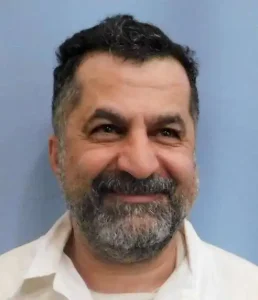Mohammad Sharifi was sentenced to death by the State of Alabama for the murders of two people
According to court documents Mohammad Sharifi came to the USA on a visitor’s visa and soon met and married Sarah Sharifi. However the marriage would quickly end and Mohammad visitor’s visa was cancelled and he was to leave the USA. Before that happened he would murder Sarah Sharifi and Derrick Brown
Mohammad Sharifi would be arrested, convicted and sentenced to death
Mohammad Sharifi Photos

Mohammad Sharifi FAQ
Where Is Mohammad Sharifi Now
Mohammad Sharifi is incarcerated at Holman Prison
Mohammad Sharifi Case
The State’s evidence tended to show the following: Sharifi, an Iranian national, came to Huntsville in December 1998 on a six-month tourist visa. Before the visa expired he married Sarah Kay Smith, an American citizen. Following his marriage, Sharifi petitioned to change his immigration status from “tourist” to “legal alien.”
Sarah and Sharifi separated in late 1999. Thereafter, Sarah, accompanied by Derrick Brown, met with Sharifi’s caseworker at the Immigration and Naturalization Service (now the Department of Citizenship and Immigration Services). As a result of that meeting, Sharifi’s petition to become a legal alien was denied, and his immigration status was changed to “illegal alien,” because his tourist visa had expired.
Sharifi purchased a .25-caliber pistol on December 6, 1999. On December 13, 1999, Sharifi went to the apartment he had shared with Sarah and forced his way inside. The Huntsville Police were called to the scene, and Sharifi was prevented from removing anything other than his clothes from the apartment. Sharifi left, promising to return. After Sharifi left, Sarah had the locks on the doors to the apartment changed. When Sharifi returned later that same day and discovered that the locks had been changed, he became upset. Sharifi became even more agitated when he learned that although he was not allowed inside the apartment, Derrick Brown was inside. Sharifi demanded of the apartment manager that Brown be removed.
The manager of the apartment complex filed a missing-person report with the Huntsville Police on December 17, 1999, because the manager had not seen Sarah in several days. December 13, 1999, was the last day Sarah and Brown were seen alive. On December 26, 1999, Sarah Sharifi’s body was found on the banks of the Tennessee River; it was wrapped in black plastic bags and tied with an electrical cord. On January 1, 2000, Brown’s body was found in the Tennessee River; it was partially wrapped in black plastic bags and tied with an electrical cord. Both Sarah and Brown had been shot in the head. Subsequent forensic testing determined that the gun used to shoot both victims was the gun Sharifi purchased in December 1999.
On December 28, 1999, the FBI arrested Sharifi in Los Angeles, California, on an unlawful-flight-to-avoid-prosecution warrant relative to Sarah’s murder. In Sharifi’s possession at the time of his arrest were the murder weapon, a license tag from Brown’s vehicle, Brown’s driver’s license, one of Brown’s credit cards, and a pair of sandals that was later determined to have Sarah’s blood on them.
Sharifi was extradited to Alabama and was incarcerated in the Madison County jail awaiting trial for the two murders. During his incarceration, Sharifi met Tasha Borner, another inmate. Sharifi wrote Borner a number of letters professing his love for her and asking her to testify that they were together on the night of December 13, 1999. Borner, who did not meet Sharifi until 2002, turned the letters over to the district attorney and was given a plea deal in exchange for her testimony against Sharifi.
Sharifi’s defense was that he was in Los Angeles, California, at the time of the murders. Aghaishahabdin Moughari testified that Sharifi came by his house in Huntsville on December 13, 1999, that Sharifi’s car was loaded with his possessions, and that he told him that he was moving to California to find work. Moughari also testified that on December 14, 1999, Sarah came by his house looking for Sharifi.
Sharifi’s father, Hossain Sharifi, testified that at the time of the murders he was living in Iran and that he spoke to Sharifi everyday at approximately 2:00 p.m. Huntsville time. He said that on December 13, 1999, he telephoned the apartment Sharifi had shared with Sarah, and a man answered the telephone and gave the phone to Sarah. He further testified that on December 15, 1999, Sharifi telephoned him in Iran and told him that he had moved to California.
The jury chose to believe the State’s version of the events and convicted Mohammad Sharifi of murdering Sarah and Brown during one act or pursuant to one course of conduct. After a separate sentencing hearing, the jury, by a vote of 10-2, recommended that Sharifi be sentenced to death. The court then issued an order sentencing Sharifi to death. This appeal, which is automatic in a case involving the death penalty, followed. See § 13A-5-53, Ala.Code 1975.
https://caselaw.findlaw.com/court/al-court-of-criminal-appeals/1046307.html









